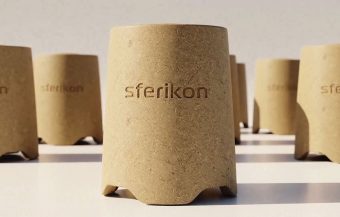
Within technological engineering, one of the narrower disciplines is called materials engineering – an area whose focus is understanding the various characteristics of materials to create new materials with improved properties to make them more resistant, stronger, more durable, more sustainable, more economical, depending on the needs of different industries. Engineers researching this field examine how various processes and processing of materials affect the resulting state and structure of the materials. Due to the current discourse on recycling, waste management and circular economy, materials engineering plays a significant role in solving the mentioned challenges.
Young industrial designers, former students of the Faculty of Applied Arts, decided to devote themselves to their study program – industrial design.
Nikola Đurašković and Nedeljko Tica founded Sferikon to deal with the problems of agricultural waste from our environment. They first discussed this project with Professor Irena Živković, who is an expert in the field of science and engineering. As Professor Živković, the third member of the Sferikon team, explains, their product is a series of materials called Sfericorn – a combination of production industry, sustainable development, and circularity.
– Sfericorn materials are classic composite materials made of two or more different materials, giving the composite some new properties compared to the starting components. Sfericorn materials use biodegradable and compostable materials, one of which is a reinforcing component obtained from agricultural waste from corn cultivation. Corn is the most represented crop on the fields in Serbia and generates a large amount of agricultural waste that has no other purpose than fuel production and, in certain species, for animal feed – explains Professor Irena.
IN FOCUS:
- PROCREDIT BANK – THE NEW FACE OF DIGITIZATION
- CEEFOR IS DESIGNING ANOTHER POWER PLANT
- THE NEW ERA OF ARTIFICIAL INTELLIGENCE – AND WHAT IT MEANS FOR THE DATA CENTER SEGMENT

The goal is to develop a material to be used as an alternative to synthetic polymers, i.e. common plastic. Interestingly, their materials have the potential to be applied to a variety of products, including hard plastic parts of electronic devices, furniture components, car interiors, and even the architectural industry. One of the key attributes of the Sfericorn material is its exceptional sound insulation ability, which makes it ideal for products where acoustic properties are essential. For example, in-home air purifiers, where fans or turbines produce noise, Sfericorn can effectively act as a sound insulator by reducing the resonance and noise generated by standard plastic parts.
Although the material is still in the development phase, there is already considerable interest in it. Also, Sferikon members work to make integrating their material into other products as simple as possible to be as competitive and economical as possible, besides being functional, aesthetic and sustainable, and to avoid costs related to applying such specific materials.
Prepared by: Milica Vučković
Read the story in the new issue of the Energy portal Magazine SUSTAINABLE ARCHITECTURE AND FINANCING OF GREEN CONSTRUCTION



